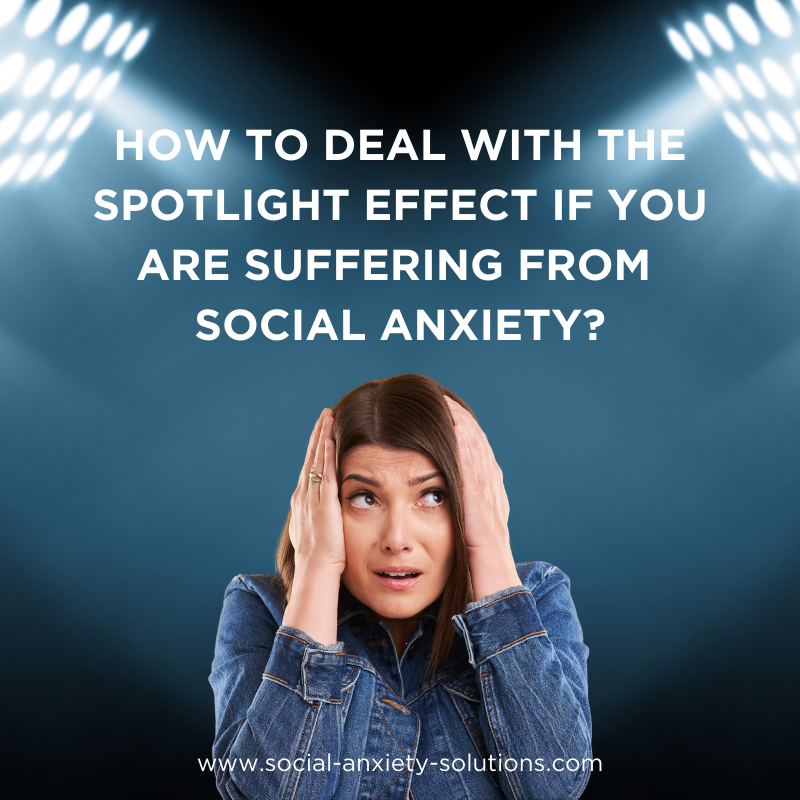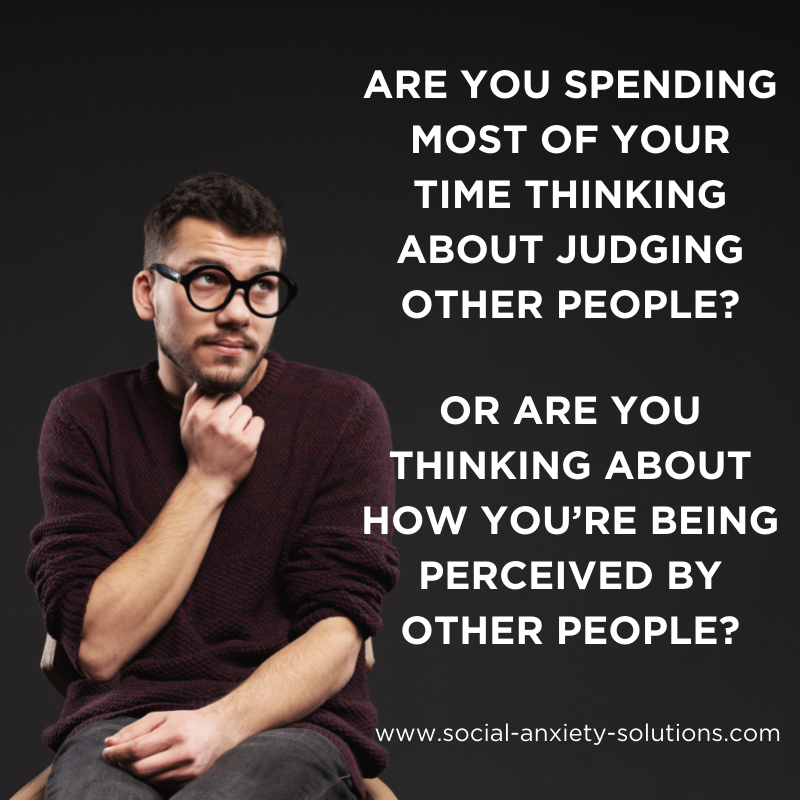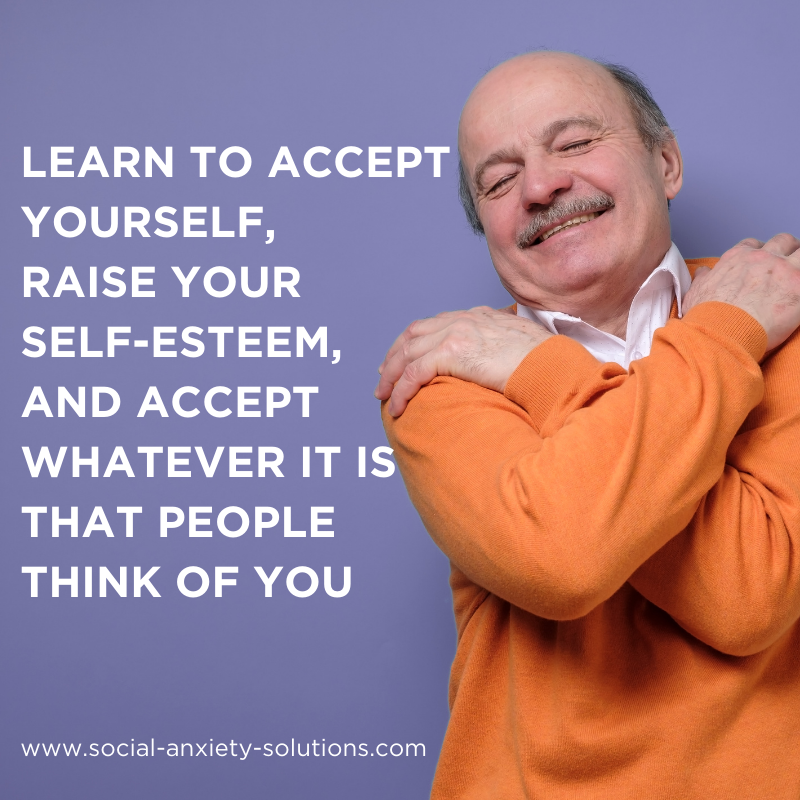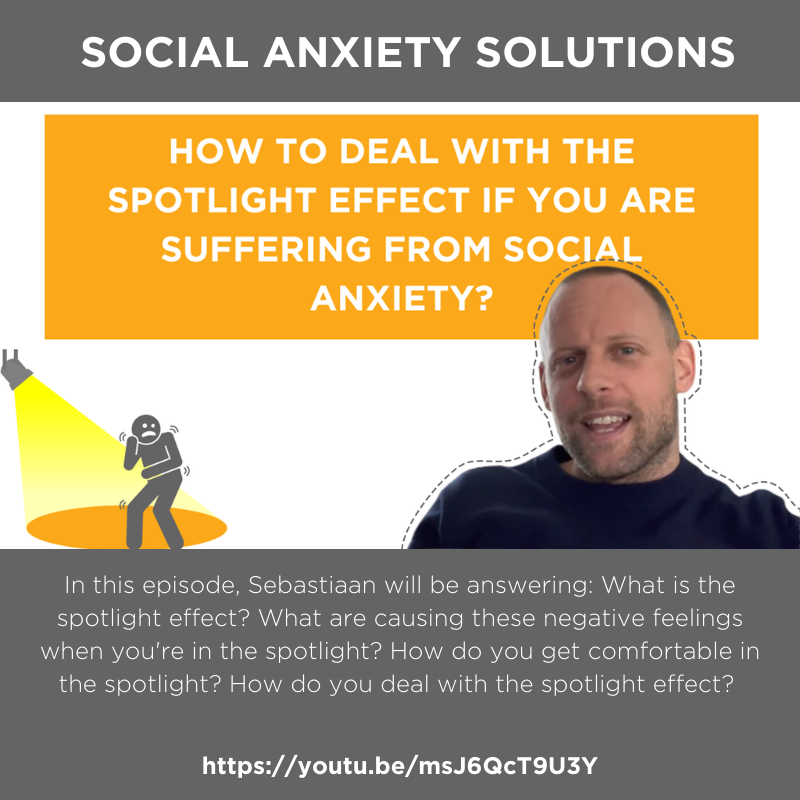SUMMARY
Have you felt like you are in the spotlight when you are in a social situation?
When it feels like everyone is constantly watching you, judging you, scrutinizing you…
…does this make you feel self-conscious?
…does this make you uncomfortable and anxious?
In this episode, Sebastiaan will be answering:
– What is the spotlight effect?
– What are causing these negative feelings when you’re in the spotlight?
– How do you get comfortable in the spotlight?
– How do you deal with the spotlight effect?
Learn how you can start chipping away the layers of your Social Anxiety by going to our website at: https://www.social-anxiety-solutions.com
FULL TRANSCRIPTION
How to deal with the spotlight effect if you’re suffering from social anxiety?
Hello, my name is Sebastiaan van der Schrier. I’m a former Social Anxiety Disorder sufferer and a Social Confidence Coach.
I’m making these videos for over ten years. I specialize in helping people overcome social anxiety so they feel calm, relaxed, and at ease in social situations so that you no longer think that the spotlight is constantly on you.
And even when you’re aware that the spotlight is factually on you, you’re still okay; you’re still relaxed, you’re still at ease.
Hmm…how do you get to that place?
That’s more or less the question that I got from someone in my email – from John, and he writes:
Hi! I have social anxiety and have recently learned of the spotlight effect. I believe this may be contributing to my social anxiety. What can you tell me about this and what is your advice? Thanks, John.
John, to be honest, I never heard of the spotlight effect. But I have heard off many, many times is people saying that they’re afraid of being in the spotlight.
That they are worried when they’re the center of attention.
And that they sense that they’re the center of attention more often than they actually are.
So, when reading up on what the spotlight effect really is, according to some psychologists, it is exactly indeed what you experienced, more strongly when you’re dealing with social anxiety.
And the spotlight effect is the feeling that the spotlight is on you. And that everyone’s constantly watching you, observing you, judging you, scrutinizing you, and so on. So that’s what it is.
It’s something that a lot of people have; also, people that don’t necessarily have strong social anxiety. But a lot of people are a little bit self-conscious.
I have friends and family members that are not anxious, but when I put the camera on, they all of a sudden start acting differently.
They don’t get anxious. But I’ll give a good example, I was recently taking classes with one of my teachers in salsa, and she actually felt uncomfortable turning the camera on, and that can happen. that’s normal. Lots of people have it.
Or my mom, for example, doesn’t like leaving a voice message because she doesn’t like the sound of her voice.
Many people have that, so it’s a common thing.
It’s exaggerated in people that suffer from social anxiety. Why is that?
Well, because anxiety is actually just a symptom of a deeper underlying problem.
That deeper underlying problem, i.e., being lowered self-esteem, lack of self-acceptance, social fears. And these problems make you self-conscious, more self-conscious.
And so that “spotlight effect” is exacerbated.
So what do about it?
Well, cognitive interventions will focus on helping you realize that it’s not true.
And that can be helpful.
I once heard it said: “other people are too concerned to be with themselves, to be judging you. Everyone’s in their own little world.”
And when I heard that, I’m like, “Wow, that’s great! I wish I could believe that.”
It just doesn’t feel that way to me. Logically, I can get there. But it doesn’t feel true to me at the moment.
That’s the problem with most logical things. They don’t override your emotional programming, but it can be helpful to realize that because that’s, in fact, the truth.
Think about it for yourself.
Are you spending most of your time thinking about judging other people?
Or are you thinking about how you’re being perceived by other people?
Right? It’s the latter.
You’re more busy with your own world. That’s for other people the same.
People got their stuff going on. They’ve got their issues. They got their problems. They got the work. They got their family. They get the kids, etc.
You’re not that important to them.
So I hate to bring it to you, but you’re irrelevant to most people, especially strangers.
What do they care? They don’t even know you.
And if someone is mean to you, or judges you, or gives you a weird look or something like that? That’s nothing personal because they don’t know you, right? It only make sense, they don’t know you.
So they’ve got their own stuff going on. So it’s got nothing to do with you.
But that’s all just logic.
If that helps you already? Great, fantastic. It can open things up. It can be a starting point of perspective to work towards.
However, you want to become emotionally congruent with that perspective.
That’s the work.
Now how to do that is a much longer story. But basically, the outcome is that you want to get yourself to a place where you accept whatever people think of you.
They think of you as a loser? All right, go ahead, you’ve got my permission.
They think of you as a dork? Fine, go ahead and think about it.
They think that you are amazing? Go ahead and think about it.
Whatever it is that they’re thinking of you, give them permission. They can do it.
That’s your ticket to freedom.
Actually, what you’ll find is that what you’re afraid of, that they are thinking of you?
Is what you are thinking of yourself deep down, and you’re projecting it onto other people. And then you’re anticipating that they’re thinking that of you, where it’s actually just your own thoughts of yourself.
It’s your own insecurity.
It’s your own lowered self-esteem.
It’s your own lack of self-acceptance.
And that’s just how it shows up.
So that’s what you need to work on.
Well, how do you deal with that?
How do you accept yourself?
How do you accept the parts of yourself that are unacceptable?
How do you accept the emotions that you do not want to accept?
How do you stop feeling bad about yourself and start feeling good about yourself?
How do you like, accept, appreciate, respect, and trust yourself?
Well, I wish I could say it happens like that. But it’s a journey.
It’s a journey to social confidence.
It’s a journey to social ease.
So you’re at wherever you are at.
Your brain is perceiving threat, and as a result, it’s activating the fight-flight-freeze response that releases hormones into your bloodstream, cortisol, adrenaline, heart starts raise, a lump in your throat, your brain starts scanning for all the potential things that could go wrong.
And all of these symptoms we’ve labeled as anxiety.
You experience that around people, so it’s social anxiety. That’s the label. But it’s just a label. Right?
So what’s happening?
How come you have that perception of threat?
Well, you learned it. You’re not born with social anxiety.
You learned it through painful experiences, through memories. Your brain is currently perceiving certain social situations as similar to painful ones you had in the past.
And it doesn’t have to be social experiences. A particular person can remind your brain that it’s similar to your dad. The way this guy looks is the way your dad looked when you were younger. And your dad looks mean because you were doing things wrong. And that triggers. Your amygdala is comparing stuff from your past with your dad, with this guy. And it’s like, “Well, my dad was mean, and he would spank me and would yell at me.” And this guy looks just like your dad because your brain is generalizing incoming information, compares it, and is like, “Oh, you re-live the pain from beating from your dad. And your brain also activates the alarm, **careful, danger. You’re going to get hurt again**, you feel anxious.
So that’s actually what’s happening. And you need to process these painful experiences.
You need to neutralize these traumatic experiences.
You need to shift the belief that you learn from them.
You need to deal with the negative fantasies you’ve been imagining over and over again about the possible things that can go wrong socially.
And bit by bit, chip away at the layers of the problem.
It can seem like such an insurmountable problem, such a massive problem to overcome. And it is, for a lot of people, a massive problem to overcome.
But just like if you’re 150 kilos or 200 pounds overweight, oh my god, how am I ever going to get into top shape?
Well, you start small, and you start going to the gym, you start eating better, and you take just little steps every single day, and see where you’re at in and six months, see where you’re at in a year.
Your life will be different when you take little bits of change.
And of course, you want to apply to tapping, EFT (Emotional Freedom Techniques) because that addresses the emotional side of the problem. And social anxiety is, for the most part, an emotional issue. It’s not a thinking issue.
It’s the emotionalized thoughts that are the problem.
And it’s the emotions that you experience socially that are the problem.
So, how do you overcome the spotlight effect while you learn to accept yourself, raise your self-esteem, and accept whatever it is that people think of you?
And you get to that place by working through your traumatic experiences, shifting your limiting beliefs, and neutralizing these emotionalized scary fantasies, these worst-case scenarios that you’re making in your mind.
That’s an emotional journey, and it’s a journey to social confidence.
If you want to learn more about it, go to my website, social-anxiety-solutions.com
Here I teach how to use tapping in combination with traditional psychology as rapidly as possible, which I know of at least, overcome your social anxiety.
With this, you can overcome your social anxiety completely. You don’t need to force yourself to face your fears and that kind of stuff.
You do face your fears, but you mostly face them from the comfort of your own home, where you use your imagination to trigger the negative emotions and use the tapping to neutralize these negative emotions.
You don’t hide in your house. You keep living your life.
But this way, you can, bit by bit, become more and more comfortable being yourself being in the spotlight. And then eventually you can shoot a video like this, and you feel just as comfortable as you do talking to your best friend, or pet or whatever.
Right. I hope this is helpful.
Go to social-anxiety-solutions.com
And John, thank you for your question.
Bye for now.
If you experience Social Anxiety, click below to receive the FREE “7 Secrets to Social Confidence” Mini Course!
- How To Stop Worrying - January 17, 2024
- How to Reduce Facial Blushing with EFT Tapping? - June 29, 2023
- Are You Scared to Get Anxious? Here’s how to fix it! - June 16, 2023





